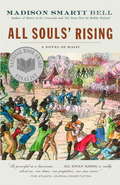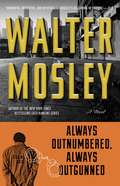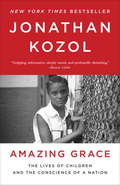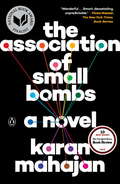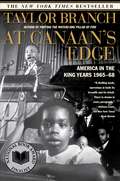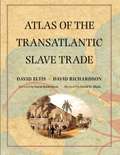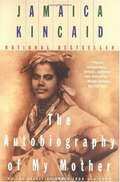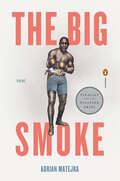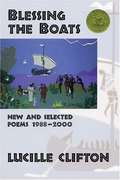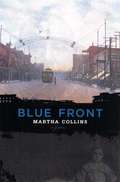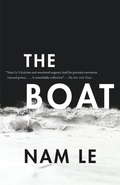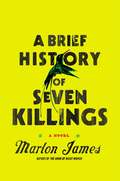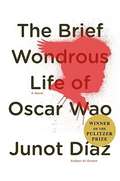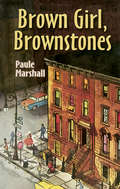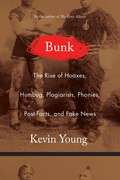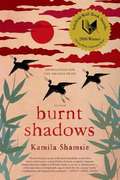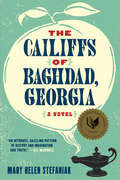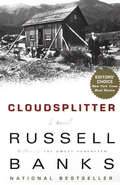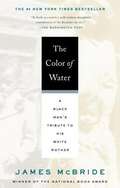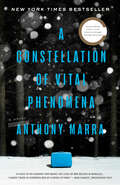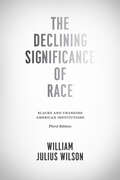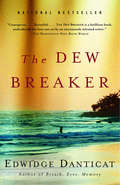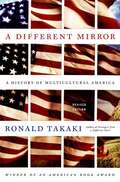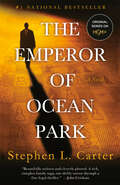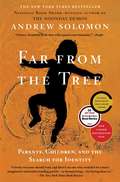Special Collections
Anisfield-Wolf Book Award
Description: The Anisfield-Wolf Book Award recognizes books that make important contributions to understanding racism and help develop an appreciation of the rich diversity of human cultures. #award
- Table View
- List View
All Souls' Rising
by Madison Smartt BellIn this first installment of his epic Haitian trilogy, Madison Smartt Bell brings to life a decisive moment in the history of race, class, and colonialism.
The slave uprising in Haiti was a momentous contribution to the tide of revolution that swept over the Western world at the end of the 1700s.
A brutal rebellion that strove to overturn a vicious system of slavery, the uprising successfully transformed Haiti from a European colony to the world's first Black republic.
From the center of this horrific maelstrom, the heroic figure of Toussaint Louverture-a loyal, literate slave and both a devout Catholic and Vodouisant-emerges as the man who will take the merciless fires of violence and vengeance and forge a revolutionary war fueled by liberty and equality.
Bell assembles a kaleidoscopic portrait of this seminal movement through a tableau of characters that encompass black, white, male, female, rich, poor, free and enslaved.
Pulsing with brilliant detail, All Soul's Rising provides a visceral sense of the pain, terror, confusion, and triumph of revolution.
Always Outnumbered, Always Outgunned
by Walter MosleyNew York Timesbestselling author Walter Mosley introduces an "astonishing character"(Los Angeles Times Book Review)in this acclaimed collection of entwined tales.
Meet Socrates Fortlow, a tough ex-con seeking truth and redemption in South Central Los Angeles -- and finding the miracle of survival. "I either committed a crime or had a crime done to me every day I was in jail.
Once you go to prison you belong there. "Socrates Fortlow has done his time: twenty-seven years for murder and rape, acts forged by his huge, rock-breaking hands. Now, he has come home to a new kind of prison: two battered rooms in an abandoned building in Watts.
Working for the Bounty supermarket, and moving perilously close to invisibility, it is Socrates who throws a lifeline to a drowning man: young Darryl, whose shaky path is already bloodstained and fearsome.
In a place of violence and hopelessness, Socrates offers up his own battle-scarred wisdom that can turn the world around.
Amazing Grace
by Jonathan KozolThe author of Savage Inequalities, a New York Times best-seller, and Rachel and Her Children, winner of the Robert F. Kennedy Book Award, tells the stories of a handful of children who have--through the love and support of their families and dedicated community leaders--not yet lost their battle with the perils of life in America's most hopeless, helpless, and dangerous neighborhoods.
The Association of Small Bombs
by Karan MahajanFor readers of Mohsin Hamid, Dave Eggers, Arundhati Roy, and Teju Cole, The Association of Small Bombs is an expansive and deeply humane novel that is at once groundbreaking in its empathy, dazzling in its acuity, and ambitious in scope
When brothers Tushar and Nakul Khurana, two Delhi schoolboys, pick up their family’s television set at a repair shop with their friend Mansoor Ahmed one day in 1996, disaster strikes without warning. A bomb—one of the many “small” bombs that go off seemingly unheralded across the world—detonates in the Delhi marketplace, instantly claiming the lives of the Khurana boys, to the devastation of their parents. Mansoor survives, bearing the physical and psychological effects of the bomb.
After a brief stint at university in America, Mansoor returns to Delhi, where his life becomes entangled with the mysterious and charismatic Ayub, a fearless young activist whose own allegiances and beliefs are more malleable than Mansoor could imagine. Woven among the story of the Khuranas and the Ahmeds is the gripping tale of Shockie, a Kashmiri bomb maker who has forsaken his own life for the independence of his homeland.
Karan Mahajan writes brilliantly about the effects of terrorism on victims and perpetrators, proving himself to be one of the most provocative and dynamic novelists of his generation.
At Canaan's Edge
by Taylor BranchAt Canaan's Edge concludes America in the King Years, a three-volume history that will endure as a masterpiece of storytelling on American race, violence, and democracy. Pulitzer Prize-winner and bestselling author Taylor Branch makes clear in this magisterial account of the civil rights movement that Martin Luther King, Jr., earned a place next to James Madison and Abraham Lincoln in the pantheon of American history.
In At Canaan's Edge, King and his movement stand at the zenith of America's defining story, one decade into an epic struggle for the promises of democracy. Branch opens with the authorities' violent suppression of a voting-rights march in Alabama on March 7, 1965. The quest to cross Selma's Edmund Pettus Bridge engages the conscience of the world, strains the civil rights coalition, and embroils King in negotiations with all three branches of the U.S. government.
The marches from Selma coincide with the first landing of large U.S. combat units in South Vietnam. The escalation of the war severs the cooperation of King and President Lyndon Johnson after a collaboration that culminated in the landmark 1965 Voting Rights Act.
After Selma, young pilgrims led by Stokely Carmichael take the movement into adjacent Lowndes County, Alabama, where not a single member of the black majority has tried to vote in the twentieth century. Freedom workers are murdered, but sharecroppers learn to read, dare to vote, and build their own political party. Carmichael leaves in frustration to proclaim his famous black power doctrine, taking the local panther ballot symbol to become an icon of armed rebellion.
Also after Selma, King takes nonviolence into Northern urban ghettoes. Integrated marches through Chicago expose hatreds and fears no less virulent than the Mississippi Klan's, but King's 1966 settlement with Mayor Richard Daley does not gain the kind of national response that generated victories from Birmingham and Selma. We watch King overrule his advisers to bring all his eloquence into dissent from the Vietnam War. We watch King make an embattled decision to concentrate his next campaign on a positive compact to address poverty.
We reach Memphis, the garbage workers' strike, and King's assassination. Parting the Waters provided an unsurpassed portrait of King's rise to greatness, beginning with the 1955 Montgomery bus boycott and ending with the assassination of President John F. Kennedy in 1963. In Pillar of Fire, theologians and college students braved the dangerous Mississippi Freedom Summer of 1964 as Malcolm X raised a militant new voice for racial separatism.
The Civil Rights Act of 1964 outlawed segregation by race and mandated equal opportunity for women. From the pinnacle of winning the Nobel Peace Prize, King willed himself back to "the valley" of jail in his daunting Selma campaign. At Canaan's Edge portrays King at the height of his moral power even as his worldly power is waning. It shows why his fidelity to freedom and nonviolence makes him a defining figure long beyond his brilliant life and violent end.
Atlas of the Transatlantic Slave Trade
by David Eltis and David Richardson and James G. Basker and David Blight and David Brion DavisBetween 1501 and 1867, the transatlantic slave trade claimed an estimated 12. 5 million Africans and involved almost every country with an Atlantic coastline. In this extraordinary book, two leading historians have created the first comprehensive, up-to-date atlas on this 350-year history of kidnapping and coercion.
It features nearly 200 maps, especially created for the volume, that explore every detail of the African slave traffic to the New World. The atlas is based on an online database (www. slavevoyages. org) with records on nearly 35,000 slaving voyages--roughly 80 percent of all such voyages ever made.
Using maps, David Eltis and David Richardson show which nations participated in the slave trade, where the ships involved were outfitted, where the captives boarded ship, and where they were landed in the Americas, as well as the experience of the transatlantic voyage and the geographic dimensions of the eventual abolition of the traffic.
Accompanying the maps are illustrations and contemporary literary selections, including poems, letters, and diary entries, intended to enhance readers' understanding of the human story underlying the trade from its inception to its end.
This groundbreaking work provides the fullest possible picture of the extent and inhumanity of one of the largest forced migrations in history.
Autobiography Of My Mother
by Jamaica KincaidKincaid's new and long-awaited novel is a powerful and unforgettable story of loss, longing, loving, and survival that resonants with the proud insurgence of the human will. The story of Xuela, whose mother dies at the moment she is born, presents "an indeliable portrait of an angry woman" (New York Times) "most comparable, perhaps, to Camus' The Stranger" (Washington Post Book World).
The Big Smoke
by Adrian MatejkaA finalist for both the Pulitzer Prize and the National Book Award in Poetry--a collection that examines the myth and history of the prizefighter Jack Johnson The legendary Jack Johnson (1878-1946) was a true American creation. The child of emancipated slaves, he overcame the violent segregationism of Jim Crow, challenging white boxers--and white America--to become the first African-American heavyweight world champion. The Big Smoke, Adrian Matejka's third work of poetry, follows the fighter's journey from poverty to the most coveted title in sports through the multi-layered voices of Johnson and the white women he brazenly loved. Matejka's book is part historic reclamation and part interrogation of Johnson's complicated legacy, one that often misremembers the magnetic man behind the myth.
Blessing the Boats
by Lucille CliftonThis long-awaited collection from one of the most distinguished poets working today includes new poems written during the past four years as well as generous selections from previous collections.
Winner of the National Book Award
Blue front
by Martha CollinsA stunning account of racism, mob violence, and cultural responsibility as rendered by the poet Martha Collins the victim hanged, though not on a tree, this was not the country, they used a steel arch with electric lights, and later a lamppost, this was a modern event, the trees were not involved. --from "Blue Front"
Martha Collins's father, as a five-year-old, sold fruit outside the Blue Front Restaurant in Cairo, Illinois, in 1909. What he witnessed there, with 10,000 participants, is shocking.
In Blue Front, Collins describes the brutal lynching of a black man and, as an afterthought, a white man, both of them left to the mercilessness of the spectators.
The poems patch together an arresting array of evidence--newspaper articles, census data, legal history, postcards, photographs, and Collins's speculations about her father's own experience.
The resulting work, part lyric and part narrative, is a bold investigation into hate, mob mentality, culpability, and what it means to be white in a country still haunted by its violently racist history.
The Boat
by Nam LeThis astonishing range is topped and tailed by accounts of the uneasy reunion of a young Vietnamese writer in America with his ex-soldier father, and by the title story - the escape of a group of exhausted refugees from the Vietcong in a wallowing boat.
A Brief History of Seven Killings
by Marlon JamesIn A Brief History of Seven Killings, Marlon James combines brilliant storytelling with his unrivaled skills of characterization and meticulous eye for detail to forge an enthralling novel of dazzling ambition and scope.
On December 3, 1976, just before the Jamaican general election and two days before Bob Marley was to play the Smile Jamaica Concert to ease political tensions in Kingston, seven gunmen stormed the singer’s house, machine guns blazing. The attack wounded Marley, his wife, and his manager, and injured several others. Little was officially released about the gunmen, but much has been whispered, gossiped and sung about in the streets of West Kingston. Rumors abound regarding the assassins’ fates, and there are suspicions that the attack was politically motivated.
A Brief History of Seven Killings delves deep into that dangerous and unstable time in Jamaica’s history and beyond. James deftly chronicles the lives of a host of unforgettable characters – gunmen, drug dealers, one-night stands, CIA agents, even ghosts – over the course of thirty years as they roam the streets of 1970s Kingston, dominate the crack houses of 1980s New York, and ultimately reemerge into the radically altered Jamaica of the 1990s. Along the way, they learn that evil does indeed cast long shadows, that justice and retribution are inextricably linked, and that no one can truly escape his fate.
Gripping and inventive, shocking and irresistible, A Brief History of Seven Killings is a mesmerizing modern classic of power, mystery, and insight.
Winner of the 2015 Man Booker Prize
The Brief Wondrous Life of Oscar Wao
by Junot DiazOscar is a sweet but disastrously overweight ghetto nerd who--from the New Jersey home he shares with his old world mother and rebellious sister--dreams of becoming the Dominican J.R.R. Tolkien and, most of all, finding love.
But Oscar may never get what he wants. Blame the fukú--a curse that has haunted Oscar's family for generations, following them on their epic journey from Santo Domingo to the USA.
Encapsulating Dominican-American history, The Brief Wondrous Life of Oscar Wao opens our eyes to an astonishing vision of the contemporary American experience and explores the endless human capacity to persevere--and risk it all--in the name of love.
Winner of the Pulitzer Prize
Brown Girl, Brownstones
by Mary Helen Washington and Edwidge Danticat and Paule Marshallhis beloved coming-of-age story set in Brooklyn during the Depression and World War II follows the life of Selina Boyce, a daughter of Barbadians immigrants. Her mother craves the American Dream while her father longs for his island birthplace. The new foreword by contemporary Caribbean author Edwidge Danticat explores the novel's themes of identity, sexuality and values as well as Selina's struggle against the racism and poverty surrounding her.
Bunk
by Kevin YoungYoung finds that faker is woven from stereotype and suspicion, race being the most insidious American hoax of all.
Burnt Shadows
by Kamila Shamsie
Beginning on August 9, 1945, in Nagasaki, and ending in a prison cell in the US in 2002, as a man is waiting to be sent to Guantanamo Bay, Burnt Shadows is an epic narrative of love and betrayal.
Hiroko Tanaka is twenty-one and in love with the man she is to marry, Konrad Weiss. As she steps onto her veranda, wrapped in a kimono with three black cranes swooping across the back, her world is suddenly and irrevocably altered. In the numbing aftermath of the atomic bomb that obliterates everything she has known, all that remains are the bird-shaped burns on her back, an indelible reminder of the world she has lost.
In search of new beginnings, two years later, Hiroko travels to Delhi. It is there that her life will become intertwined with that of Konrad's half sister, Elizabeth, her husband, James Burton, and their employee Sajjad Ashraf, from whom she starts to learn Urdu. With the partition of India, and the creation of Pakistan, Hiroko will find herself displaced once again, in a world where old wars are replaced by new conflicts.
But the shadows of history--personal and political--are cast over the interrelated worlds of the Burtons, the Ashrafs, and the Tanakas as they are transported from Pakistan to New York and, in the novel's astonishing climax, to Afghanistan in the immediate wake of 9/11. The ties that have bound these families together over decades and generations are tested to the extreme, with unforeseeable consequences.
An Orange Prize Finalist.
The Cailiffs of Baghdad, Georgia
by Mary Helen StefaniakA hidden history of the South emerges when a worldly teacher leads Threestep, GA, to reinvent itself, setting in motion events that lead to triumph and tragedy for the black teenager who happens to be the smartest person in Piedmont County, Georgia, in 1938-39.
As an epigraph from The Souls of Black Folk by W. E. B. Du Bois reminds us at the start of this novel, "Throughout history, the powers of single black men flash here and there like falling stars, and die sometimes before the world has rightly gauged their brightness."
Protagonist Theo Boykin is a genius, an artist, an inventor, a Leonardo DaVinci-type, whose talents are sought after by local blacks and whites alike, but even this is not enough to save him. He falls victim to "the tragedy of ignorance and the damage caused by fear," in the words of poet Rita Dove--the first African American to serve as U.S. Poet Laureate and a member of the jury that conferred on The Cailiffs of Baghdad, Georgia the 2011 Anisfield-Wolf Award for books that "make a significant contribution to our understanding of racism and our appreciation for the diversity of human cultures."
You won't forget Theo Boykin, nor will you forget his friends the Cailiffs, especially Gladys, who tells this story with love and bewilderment, and the teacher, Miss Spivey, who changes all their lives.
Cloudsplitter
by Russell BanksA triumph of the imagination and a masterpiece of modern storytelling, Cloudsplitter is narrated by the enigmatic Owen Brown, last surviving son of America's most famous and still controversial political terrorist and martyr, John Brown. Deeply researched, brilliantly plotted, and peopled with a cast of unforgettable characters both historical and wholly invented, Cloudsplitter is dazzling in its re-creation of the political and social landscape of our history during the years before the Civil War, when slavery was tearing the country apart. But within this broader scope, Russell Banks has given us a riveting, suspenseful, heartbreaking narrative filled with intimate scenes of domestic life, of violence and action in battle, of romance and familial life and death that make the reader feel in astonishing ways what it is like to be alive in that time.
The Color of Water
by James McbrideWho is Ruth McBride Jordan? A self-declared "light-skinned" woman evasive about her ethnicity, yet steadfast in her love for her twelve black children.
James McBride, journalist, musician, and son, explores his mother's past, as well as his own upbringing and heritage, in a poignant and powerful debut,The Color Of Water: A Black Man's Tribute to His White Mother.
The son of a black minister and a woman who would not admit she was white, James McBride grew up in "orchestrated chaos" with his eleven siblings in the poor, all-black projects of Red Hook, Brooklyn.
"Mommy," a fiercely protective woman with "dark eyes full of pep and fire," herded her brood to Manhattan's free cultural events, sent them off on buses to the best (and mainly Jewish) schools, demanded good grades, and commanded respect.
As a young man, McBride saw his mother as a source of embarrassment, worry, and confusion-and reached thirty before he began to discover the truth about her early life and long-buried pain.
In The Color of Water, McBride retraces his mother's footsteps and, through her searing and spirited voice, recreates her remarkable story. The daughter of a failed itinerant Orthodox rabbi, she was born Rachel Shilsky (actually Ruchel Dwara Zylska) in Poland on April 1, 1921.
Fleeing pogroms, her family emigrated to America and ultimately settled in Suffolk, Virginia, a small town where anti-Semitism and racial tensions ran high.
With candor and immediacy, Ruth describes her parents' loveless marriage; her fragile, handicapped mother; her cruel, sexually-abusive father; and the rest of the family and life she abandoned.
At seventeen, after fleeing Virginia and settling in New York City, Ruth married a black minister and founded the all- black New Brown Memorial Baptist Church in her Red Hook living room. "God is the color of water," Ruth McBride taught her children, firmly convinced that life's blessings and life's values transcend race.
Twice widowed, and continually confronting overwhelming adversity and racism, Ruth's determination, drive and discipline saw her dozen children through college-and most through graduate school.
At age 65, she herself received a degree in social work from Temple University.
Interspersed throughout his mother's compelling narrative, McBride shares candid recollections of his own experiences as a mixed-race child of poverty, his flirtations with drugs and violence, and his eventual self- realization and professional success.
The Color of Water touches readers of all colors as a vivid portrait of growing up, a haunting meditation on race and identity, and a lyrical valentine to a mother from her son.
A Constellation of Vital Phenomena
by Anthony MarraA haunting novel set in a nearly abandoned hospital in war-torn Chechnya that is both intimate and ambitious in scope. Eight-year-old Havaa, Akhmed, the neighbour who rescues her after her father's disappearance, and Sonia, the doctor who shelters her over 5 dramatic days in December 2004, must all reach back into their pasts to unravel the intricate mystery of coincidence, betrayal and forgiveness which unexpectedly binds them and decides their fate. In his bold debut, Anthony Marra proves that sometimes fiction can tell us the truth of the world far better, and far more powerfully, than any news story. You will not forget the world he creates--A Constellation of Vital Phenomena and its characters will haunt you long after you turn the final page.
The Declining Significance of Race
by William Julius WilsonThis new paperback edition includes a major new essay in which William Julius Wilson not only reflects on the debate surrounding his book, but also presents a provocative discussion of race, class, and social policy.
The Dew Breaker
by Edwidge DanticatFrom the universally acclaimed author of Breath, Eyes, Memory and Krik? Krak!, a brilliant, deeply moving work of fiction that explores the world of a "dew breaker"--a torturer--a man whose brutal crimes in the country of his birth lie hidden beneath his new American reality.
We meet him late in his life. He is a quiet man, a husband and father, a hardworking barber, a kindly landlord to the men who live in a basement apartment in his home. He is a fixture in his Brooklyn neighborhood, recognizable by the terrifying scar on his face.
As the book unfolds, moving seamlessly between Haiti in the 1960s and New York City today, we enter the lives of those around him: his devoted wife and rebellious daughter; his sometimes unsuspecting, sometimes apprehensive neighbors, tenants, and clients. And we meet some of his victims.
In the book's powerful denouement, we return to the Haiti of the dew breaker's past, to his last, desperate act of violence, and to his first encounter with the woman who will offer him a form of redemption--albeit imperfect--that will change him forever.
The Dew Breaker is a book of interconnected lives--a book of love, remorse, and hope; of rebellions both personal and political; of the compromises we often make in order to move beyond the most intimate brushes with history.
Unforgettable, deeply resonant,The Dew Breaker proves once more that in Edwidge Danticat we have a major American writer.
A Different Mirror
by Ronald TakakiTakaki (emeritus, ethnic studies, U. of California-Berkeley) takes the perspective of ethnic, racial, and national minorities to recount the history of the US since the founding of the first English colony in 1607. The first edition won an American Book Award in 1993. This second incorporates new passages on Franklin Roosevelt's response to the Holocaust, the influx of Southeast Asian immigrants after the Vietnam War, and people pushed northward by poverty in Mexico.
The Emperor of Ocean Park
by Stephen L. CarterIn his triumphant fictional debut, Stephen Carter combines a large-scale, riveting novel of suspense with the saga of a unique family.
The Emperor of Ocean Park is set in two privileged worlds: the upper crust African American society of the Eastern seabord--families who summer at Martha's Vineyard--and the inner circle of an Ivy League law school.
Talcott Garland is a successful law professor, devoted father, and husband of a beautiful and ambitious woman, whose future desires may threaten the family he holds so dear.
When Talcott's father, Judge Oliver Garland, a disgraced former Supreme Court nominee, is found dead under suspicious circumstances, Talcott wonders if he may have been murdered.
Guided by the elements of a mysterious puzzle that his father left, Talcott must risk his marriage, his career and even his life in his quest for justice.
Superbly written and filled with memorable characters, The Emperor of Ocean Park is both a stunning literary achievement and a grand literary entertainment.
Far from the Tree
by Andrew SolomonFrom the National Book Award-winning author of The Noonday Demon: An Atlas of Depression comes a monumental new work, a decade in the writing, about family.
In Far from the Tree, Andrew Solomon tells the stories of parents who not only learn to deal with their exceptional children but also find profound meaning in doing so. Solomon's startling proposition is that diversity is what unites us all.
He writes about families coping with deafness, dwarfism, Down syndrome, autism, schizophrenia, multiple severe disabilities, with children who are prodigies, who are conceived in rape, who become criminals, who are transgender. While each of these characteristics is potentially isolating, the experience of difference within families is universal, as are the triumphs of love Solomon documents in every chapter. All parenting turns on a crucial question: to what extent parents should accept their children for who they are, and to what extent they should help them become their best selves.
Drawing on forty thousand pages of interview transcripts with more than three hundred families, Solomon mines the eloquence of ordinary people facing extreme challenges. Whether considering prenatal screening for genetic disorders, cochlear implants for the deaf, or gender reassignment surgery for transgender people, Solomon narrates a universal struggle toward compassion. Many families grow closer through caring for a challenging child; most discover supportive communities of others similarly affected; some are inspired to become advocates and activists, celebrating the very conditions they once feared.
Woven into their courageous and affirming stories is Solomon's journey to accepting his own identity, which culminated in his midlife decision, influenced by this research, to become a parent. Elegantly reported by a spectacularly original thinker, Far from the Tree explores themes of generosity, acceptance, and tolerance--all rooted in the insight that love can transcend every prejudice.
This crucial and revelatory book expands our definition of what it is to be human.
